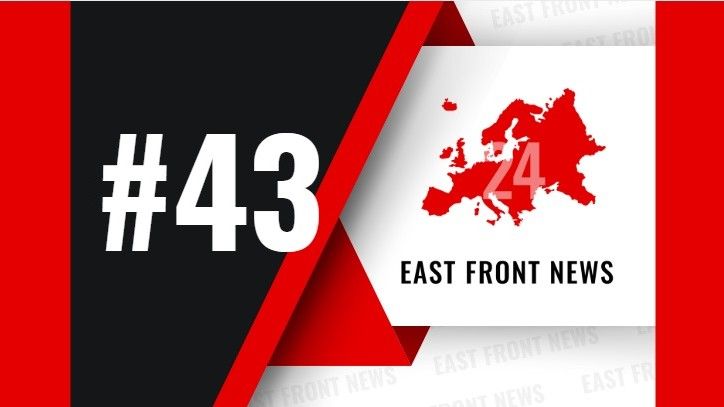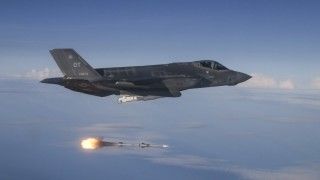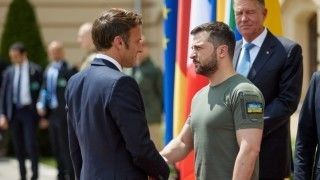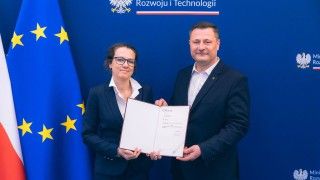- WIADOMOŚCI
East Front News #43: Three Seas Initiative Summit; US-UK deal; New Missiles for the Polish Air Force
East Front News is a weekly newsletter summarizing the past week’s most important events concerning security and the situation in the Central and Eastern Europe region. It includes original opinions and comments, along with key news items significant from a Polish perspective. If you would like to receive this newsletter, please sign up by clicking .

Missiles for the Polish Air Force
The Polish Air Force will soon be enriched with the latest American AIM-120D3 air-to-air missiles. The US Department of State has approved the sale of 400 such missiles to Poland, along with a package of logistical and technical support. The total value of the transaction is approximately $1.33 billion. The decision was announced on social media by Deputy Prime Minister and Minister of National Defence Władysław Kosiniak-Kamysz: »The latest air-to-air missiles will be delivered to our Air Force! This is another step in the major modernisation of the Polish Armed Forces.
10th Three Seas Initiative Summit
On April 28, the 10th Three Seas Initiative Summit took place at the Royal Castle in Warsaw. The summit was hosted by President Andrzej Duda, for whom this was the final summit in his role as head of state. The President emphasized that, in light of the current political situation in the Central and Eastern European region, member states have intensified their efforts in the security sector, including through the development and protection of infrastructure projects. He noted that the Three Seas Initiative currently encompasses 140 priority projects, two investment funds with a third in the planning phase, as well as an extensive network of partnerships and numerous grass roots initiatives involving regional, scientific, and economic cooperation.
During an afternoon press conference, Andrzej Duda stated that the talks focused on future investments related to security and the development of energy and transport infrastructure. The President expressed his satisfaction that, during the visit of U.S. Secretary of Energy Christopher Wright, an agreement was signed regarding the construction of a nuclear power plant in the Pomerania region. He stressed that the plant would ensure continuity of energy supply for Poland and, in the future, potentially for its neighbours as well.
The initiative brings together 13 EU member states: Austria, Bulgaria, Croatia, Czech Republic, Estonia, Latvia, Lithuania, Poland, Romania, Slovakia, Slovenia, Hungary, and Greece; with two associated participating countries – Ukraine and Moldova. The strategic partners of the Three Seas Initiative are the United States, Japan, the European Commission, and Germany. At this summit, Montenegro and Albania officially joined the Initiative as associated countries, while Turkey and Spain joined as strategic partners. This was the largest expansion of the forum in its history.
France and Poland Strengthen Ties Amid U.S. Uncertainty and Russian Aggression
In a major step toward European strategic autonomy, France and Poland are set to sign a broad-ranging bilateral treaty covering defense, security, and economic cooperation. The agreement, to be formalized on May 9 by French President Emmanuel Macron and Polish Prime Minister Donald Tusk, reflects growing urgency among European nations to reinforce intra-European military partnerships in light of persistent Russian aggression and waning confidence in U.S. security guarantees.
The pact, years in the making, has taken on new significance as former U.S. President Donald Trump reemerges in American politics with rhetoric questioning NATO commitments and advocating for a transactional approach to allied defense. Poland, a staunch NATO member and the alliance’s largest defense spender by GDP share, is signaling its readiness to diversify strategic dependencies — including discussions around France’s nuclear umbrella and potential future cooperation in deterrence policy.
„This is a clear signal that Poland is not only dependent on the U.S. but can also have other strong nuclear allies,” noted Aleksander Olech, a security analyst at Defence24. While the treaty is unlikely to immediately alter France’s longstanding, deliberately ambiguous nuclear doctrine, it opens the door for broader dialogue on European deterrence structures.
The agreement mirrors similar Franco-European treaties with Germany, Italy, and Spain, but its timing is particularly notable given Poland’s increasingly central role in NATO’s eastern defense posture and the ongoing war in Ukraine. France hopes to use the treaty not only to deepen military cooperation but also to expand its economic footprint — particularly in Poland’s transition away from coal. Despite losing out to the U.S. on Poland’s first nuclear power project, France is positioning itself for defense industry opportunities, including helicopter and submarine procurement.
While the bilateral relationship has been rocky in recent years — notably after the cancellation of a major Airbus helicopter deal in 2016 — the new treaty represents a reset in Franco-Polish relations. It reflects a growing consensus across Europe that deeper regional defense integration is no longer optional. As Macron continues to press for European strategic autonomy, and Tusk signals openness to a broader European security architecture, the treaty underscores a shift in continental thinking: Europe must prepare to stand on its own if the transatlantic alliance falters.
US-Ukraine resources deal
After months of diplomatic tensions between Washington and Kyiv, the parties have reached an agreement on the creation of a raw materials agreement. On April 30, 2025, U.S. Treasury Secretary Scott Bessent and Ukrainian Economy Minister Yulia Svyrydenko signed the so-called „raw materials agreement” in Washington, which had been the subject of talks since the Joe Biden administration and which led to a temporary downgrade in bilateral relations between the U.S. and Ukraine after the presidents met in the Oval Office.
It is worth noting that the actual text of the agreement was presented by the Ukrainian side. The document included the establishment of a special American-Ukrainian investment fund. In the agreement, Russia was explicitly named the aggressor, and the US Treasury Department added that Moscow would not be able to benefit from the fund’s financial profits. Another important issue is the definition that Kiev is not obliged to reimburse the costs of military aid provided by the US - Donald Trump suggested that Kiev owed Washington $350 billion, which was an inflated amount in itself, but had a political impact on Ukrainian decision-makers. In addition, in addition to the extraction of rare earth metals, the agreement provides for the extraction of crude oil, natural gas and other hydrocarbons - it is worth emphasizing that in all cases the resources remain the property of Ukraine. The agreement is also in line with Ukraine’s EU course, as it allows for the renegotiation of some of its provisions in order to adapt them to European Union legislation.
The document does not spell out any security guarantees from Washington to Kyiv, but the U.S. says it is necessary for potential further consideration of military aid to Ukraine. One intriguing point highlighted by the Ukrainian government is that for the first decade of the reconstruction investment fund, profits will be „fully reinvested in the Ukrainian economy,” either in new projects or in reconstruction.
Georgia's Strategic Drift: From Reform Leader to Regional Outlier
Once hailed as a model of democratic transition in the post-Soviet space, Georgia now finds itself increasingly isolated — not because of regional constraints, but due to its own political choices. Under the Georgian Dream government, Tbilisi has distanced itself from Western allies, adopted Kremlin-aligned narratives, and weakened democratic institutions at home.
The 2022 Russian invasion of Ukraine was a turning point. While the Georgian public overwhelmingly supported Ukraine, the government avoided firm alignment with the West, warning instead that support for Kyiv could provoke war with Russia. This ambiguity, reinforced by state propaganda and democratic backsliding, has fractured Georgia’s international credibility.
Traditional allies such as Poland, the U.S., and Baltic states have expressed concern, suspending cooperation and imposing sanctions on Georgian officials. Regionally, Tbilisi is increasingly absent from key security discussions, while Russia militarizes the Black Sea — including through a naval base in occupied Abkhazia. Georgia’s voice is missing, not by exclusion, but by self-imposed withdrawal.
Most alarming is the government’s attempt to rewrite the narrative of the 2008 war by portraying Georgia as the aggressor. This could undermine its legal standing on Abkhazia and South Ossetia, legitimizing Russian occupation in the eyes of international law.
Despite mass protests and strong public support for EU integration, Georgia’s pro-Western path is faltering. Without a change in political direction, the country risks long-term strategic irrelevance — caught between its democratic aspirations and the gravitational pull of authoritarianism.
New President of the Polish Space Agency
On 29th April, the Minister of Development and Technology, Krzysztof Paszyk, presented the letter of appointment to the position of President of the Polish Space Agency (POLSA).
Dr. Marta Ewa Wachowicz has been appointed as the new President of the Polish Space Agency. It is worth noting that she holds an academic background in space research. She earned her PhD in physics in the field of space physics at the Space Research Centre of the Polish Academy of Sciences.
If you would like to receive this newsletter, please sign up by clicking.
East Front News is a weekly newsletter and article on Defence24.com summarizing the past week’s most important events concerning security and the situation in the Central and Eastern Europe region. It includes original opinions and comments, along with key news items significant from a Polish perspective.
Aleksander Olech, PhD & Jakub Palowski, Deputy Ed. in Chief, Michał Górski




















